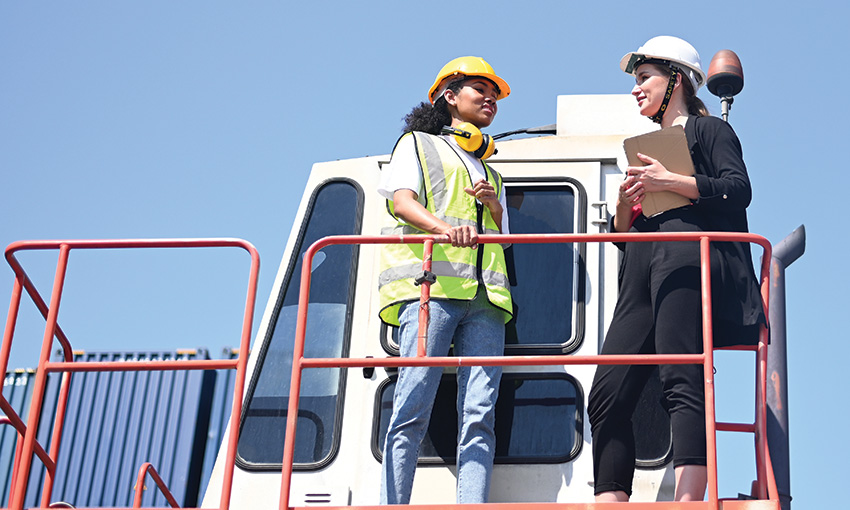MENTORING is a two-way street. It is a way of exchanging information, ideas, advice, and challenges, and solutions, while focusing on development, development planning, goal setting and achievement, mentoring and advice, and wellbeing.
The maritime industry manages 98% of Australia’s exports and imports, yet it is a hidden industry. Many people, myself included, stumble into roles with little knowledge or understanding of what path to take and where it may lead. This largely invisible industry is crucial for global, national and state supply chains. It is imperative that we create an industrywide culture of mentoring for innovation, creativity and growth to foster the future of the maritime industry – focussing on all stages of our careers from starting out in the industry to progressing into senior roles.
It has taken me a long time to come to fully appreciate the term “mentoring”. It is an activity that I have encountered and initiated, both as a mentor and mentee, in formal and informal approaches. Throughout my career, through many obstacles or opportunities, I have sought support, advice, guidance and often “a good hard talking to” from those who made themselves available. Depending on where I needed to develop and grow, this has been from people who are like myself and also from those who have completely different views, perspectives and personalities. I don’t always like what I hear, but I listen with respect as I know my mentors are invested in supporting me and my goals.
UNDERSTANDING MENTORING
The terms surrounding mentoring can be confusing – and it is important to understand the differences and similarities between coaching, mentoring and sponsorship. Some of the most successful long-term mentoring relationships start out casually. Yet, without offering access to formal mentoring opportunities, many miss out on this valuable development opportunity. The approach to mentoring depends upon the needs and expectations of the mentee. Finding the right fit – with a communication style that reflects the needs of the mentee and the goal of the relationship – will determine success.
Mentoring has many benefits for an innovative and inclusive maritime industry. An important benefit is that is reduces the power distance; for example, when a senior port executive or marine pilot mentors a graduate trainee or cadet. The mentee receives great insights while building confidence in speaking with senior industry leaders. The mentor gains insights into what the future generation is looking for in maritime careers. Connecting senior industry executives and managers with women in their early careers results in continued development and confidence to influence a better workplace and industry for future generations.
EXAMPLES OF THE POWER OF MENTORING
A marine pilot described mentoring as “a way to connect the past with the future by creating a pathway for knowledge to flow from one person to another”. In piloting there is a vast amount of knowledge gained through lived experience that a new pilot has not yet been exposed to.
A deck officer cadet described the mentorship they received as “giving me the confidence I needed to continue my career”.
A first-year seafarer student found the connection with a woman seafarer invaluable: “there’s someone else out there that knows how you feel and has dealt with it before. Especially when you’re first starting out in the industry, or when you are at a crossroad in your career and don’t really know where to go next”.
IMPROVING DIVERSITY IN MARITIME
As women in maritime, we have the added challenge of gender related issues in addition to the already significant challenges of working in the industry. Mentoring supports growth in the workplace and reduces gender inequalities. Personally, I thoroughly enjoy the process of sharing stories and lessons learned.
Mentoring can also take advantage of advances in technology. The International Association of Ports and Harbours has set up bespoke mentoring programs to support maritime women through connections to industry mentors, both male and female. These relationships provide an opportunity to extend professional networks globally and draw on international best practices, as well as connect with other women in specialised maritime roles. The program connected a woman who was the first in her maritime workplace with a woman in a similar role with thirty years of relatable technical and workplace experience on the other side of the world.
Mentoring not only enhances technical skill development, but also provides an opportunity to share experiences of being the first and reducing feelings of isolation. Mentoring can result in lifelong relationships, both as colleagues and friends.
While mentoring is important for women in the maritime industry, it is not always available.
In many aspects, this is often overcome with a professional network, resulting in opportunities for a group mentoring situation.
Networks build confidence that can support those who may be afraid to reach out to someone they do not know yet.
In Australia we have great access to formal mentoring arrangements for people who work in the maritime industry at all stages of their careers. These organisations are always looking for mentors, and mentees, and include:
- PIANC Australia & New Zealand Members Mentoring Program
- Australian Maritime Mentoring Program
- WISTA Australia Mentoring
- Offshore & Specialist Ships Australia
Industry organisations that provide networking opportunities around Australia include:
- Women Offshore MentorSHIP
- The Nautical Institute
- Institute of Marine Engineer, Science & Technology (IMAREST)
- Nautical Institute Women in Maritime
- Women in Male Dominated Occupations and Industries
This article appeared in the July 2023 edition of DCN Magazine





